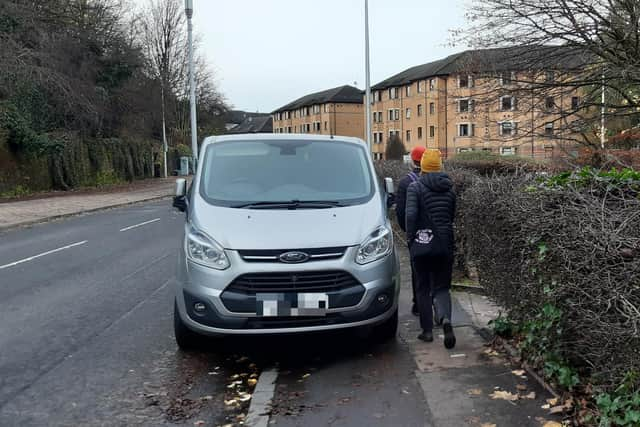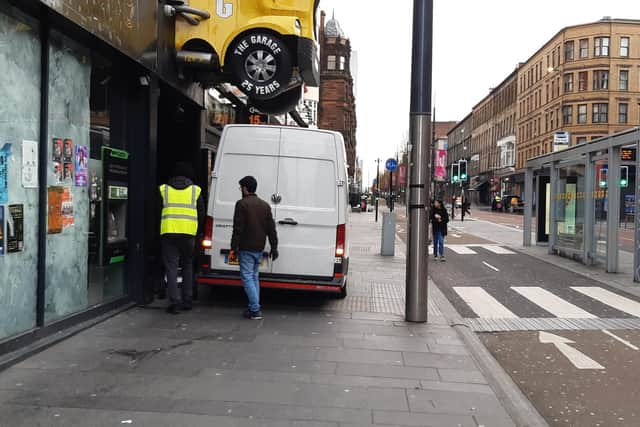Pavement parking ban Scotland: When is the ban being introduced? How much will drivers be fined? Will the ban be enforced?
Thousands of drivers who park on pavements across Scotland face £100 fines in a major change to road laws which comes into force this week.
The prohibition, which comes 13 years after being first proposed by MSPs, is expected to have a significant impact on more than 500 streets in Edinburgh alone.
Advertisement
Hide AdAdvertisement
Hide AdThe Scottish capital will be in the vanguard of enforcing the move from January 29. The ban is designed to improve safety for older people, those with mobility problems and visual impairments, and parents with pushchairs, who are forced onto the road by vehicles blocking pavements.
However, there are fears the displaced parking will have big implications in some areas, and the City of Edinburgh Council said it would only consider exempting some streets if there were no other viable options.
Stuart Hay, director of Living Streets Scotland, which campaigns for pedestrians, said: "We are delighted that a decade-long campaign to make pavements safe is crossing a vital milestone. However, lots more work is needed to win over drivers and put in place responsive enforcement. Other councils need to embrace the Edinburgh approach of putting disabled people first and avoiding lots of exemptions."
Guide Dogs Scotland said vehicles obstructing pavements undermined visually impaired people’s confidence and was a nuisance for everyone. Transport minister Fiona Hyslop said: “Pavement parking is unsafe, unfair and illegal.”
A Heriot-Watt University study published on Monday on improving streets for pedestrians, commissioned by walking and cycling organisation Sustrans, found “inconsiderate parking was seen to contribute to the poor state of pavements in many areas”.
Scottish Conservatives transport spokesperson Graham Simpson said: “Everyone wants to discourage inconsiderate and hazardous parking. But councils need to take a pragmatic approach when deciding on whether to enforce the ban and to what extent. They need to take the public with them.”
When is the pavement parking ban being introduced?
Monday, December 11, when fines can be issued across Scotland.


When will it enforced?
The City of Edinburgh Council said penalties would be imposed from Monday, January 29. Other councils have yet to say when they will follow suit, but many are at a less advanced stage.
How much will drivers be fined?
£100, reduced to £50 if paid within 14 days.


Will any drivers be exempt?
Advertisement
Hide AdAdvertisement
Hide AdYes – to enable “certain deliveries and collections” for under 20 minutes, bin lorries and postal services, along with the emergency services and the military, and medical staff and other drivers assisting with emergencies. Roadworks vehicles will also be exempt.
Are any pavements eligible for exemption?
Where 1.5m (5ft) width remains unobstructed when a vehicle is parked on it, or where an emergency vehicle would be impeded if a vehicle was parked on the adjacent road.
Will any other type of parking be included in the ban?
Double parking and blocking dropped kerbs will also be illegal.
How will Edinburgh be affected?
Of the 5,217 streets assessed by the city council, more than 550 have been classed as “red”, which it described as those with “narrow footways and carriageways, where endemic footway parking takes place”.
It said these areas were also “where displacement of parking, a potential result of enforcement action, is most likely to impact on the wider road network”. The council said in such areas, the ban “could inadvertently have a negative impact”.
The greatest number of these are in the south east of the city, in the Liberton/Gilmerton ward (70 streets) and Portobello/Craigmillar ward (59). There are 57 “red” streets in the Almond ward in the north west and 55 in the Forth ward in the north of the city.
However, the council said: “Only where impacts on the wider network, road safety or servicing cannot be resolved using parking restrictions and prohibitions would an exemption order be considered.”
What are other councils planning?
Glasgow City Council said it was about to assess pavement parking to see if any streets should be exempt from the ban, then councillors would decide how an enforcement scheme could be implemented “in due course”.
Advertisement
Hide AdAdvertisement
Hide AdAberdeen City Council spokesperson said: “We are arranging for our city wardens to provide for monitoring and enforcement, with a formal date for commencement expected in early 2024.” Dundee City Council said only that enforcement would start “on a phased introduction approach”, but gave no timescale.
However, some councils said they were unable to enforce the ban, with Inverclyde reporting this month it could not do so “without the necessary funding and resources for implementation and management”. It estimated the cost at more than £250,000 as more than 300 roads might require exemptions.
The Scottish Government’s Transport Scotland agency said no councils had told it they were unable to enforce the ban, but it was discussing with them what further funding was required.
Why has the ban been so long coming?
Liberal Democrat MSP Ross Finnie introduced a private members’ Bill to the Scottish Parliament for the measure in 2010. However, it, along with similar bills introduced by SNP MSPs Joe Fitzpatrick and Sandra White, stalled for technical reasons, including because it was outwith Holyrood’s powers.
However, these were overcome and the ban was included in the Scottish Government’s Transport (Scotland) Act, which was passed in 2019. Introduction was delayed by the Covid pandemic.
What do motoring groups say?
Neil Greig, Scotland-based adviser to IAM RoadSmart said: “The biggest impact will be on streets where informal pavement parking takes place on both sides, leaving a perfectly usable space down the middle for other traffic, bin lorries, deliveries and emergency access.
"If pavement parking is enforced there, you lose 50 per cent of parking spaces and are left with local people looking for somewhere safe to park their biggest asset – their car. Will councils provide extra secure parking for these displaced vehicles? Of course not.”
Comments
Want to join the conversation? Please or to comment on this article.